#louisa marie
Text
who wrote you into existence and what makes you think so? tell me in the tags or comments!
#classic lit#william shakespeare#jane austen#oscar wilde#charlotte bronte#edgar allan poe#j.r.r. tolkien#louisa may alcott#virginia woolf#c.s. lewis#lucy maud montgomery#mary shelley#tumblr polls#polls
1K notes
·
View notes
Text
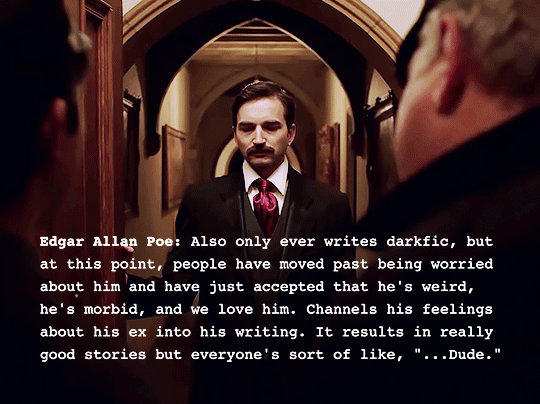
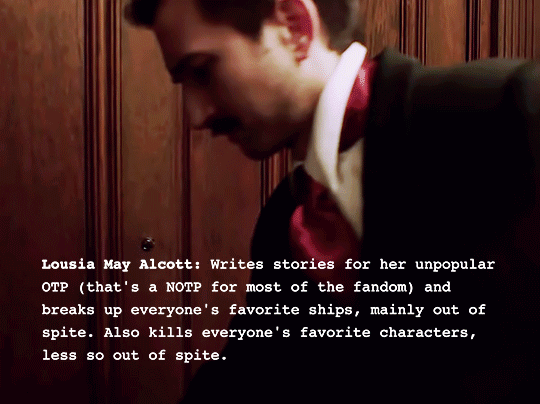

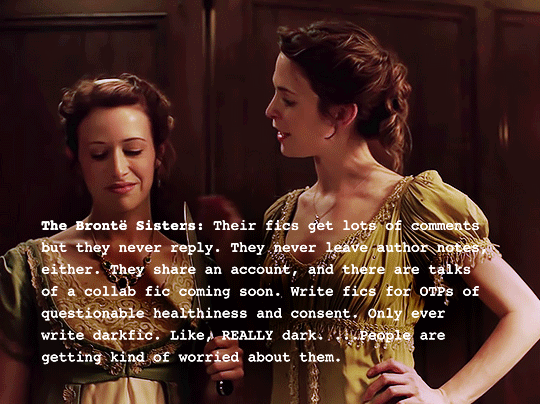
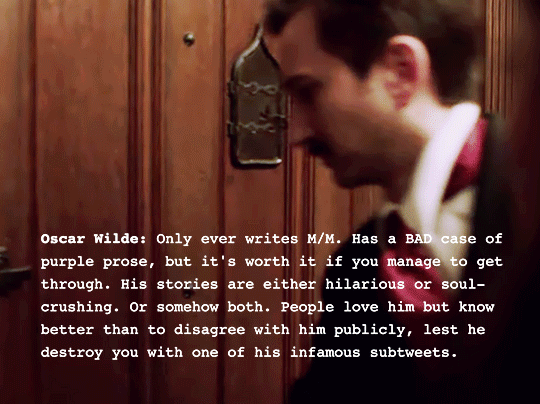
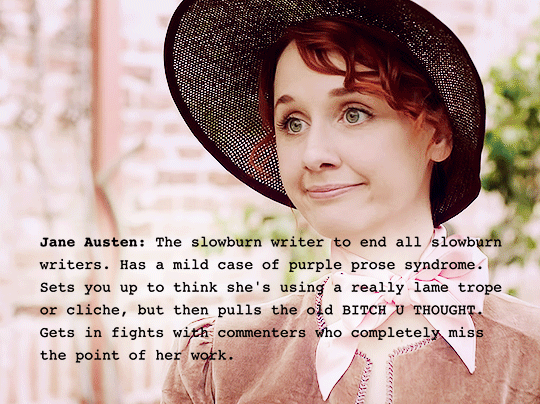
classic lit authors on ao3 [insp]
Edgar Allan Poe’s Murder Mystery Dinner Party [x]
#edgar allan poe's murder mystery dinner party#shipwrecked comedy#userthing#usercreate#perioddramaedit#edgar allan poe#sean persaud#louisa may alcott#mary shelley#the brontes#charlotte bronte#anne bronte#jane austen#oscar wilde#my edits#poepartyedit#writing#fanfiction#classic literature#tag yourself i'm jane austen XD#although more realistically right now i'm george r.r. martin (to clarify - the 'not writing!' part lol)
305 notes
·
View notes
Text
in season 3's prom episode of derry girls, it was clear that the dynamics between the mothers when they were in high school were replicated in the next generation too. The four women attended the prom with Diedre's cousin accompanying her (and then all of them). So we have four girls and a male cousin of one of them which is just like the Derry girls' situation. And Rob was openly gay. Doesn't this hint at James being gay/queer too ?
#erin x james truthers don't come for me I am just theorising here#derry girls#orla mccool#james maguire#michelle mallon#claire devlin#sister michael#mother mary#aunt sarah#sarah mccool#erin quinn#mary quinn#nicola coughlan#jenny joyce#saoirse monica jackson#louisa harland#jamie lee o'donnell#dylan llewellyn#siobhan mcsweeney
186 notes
·
View notes
Text
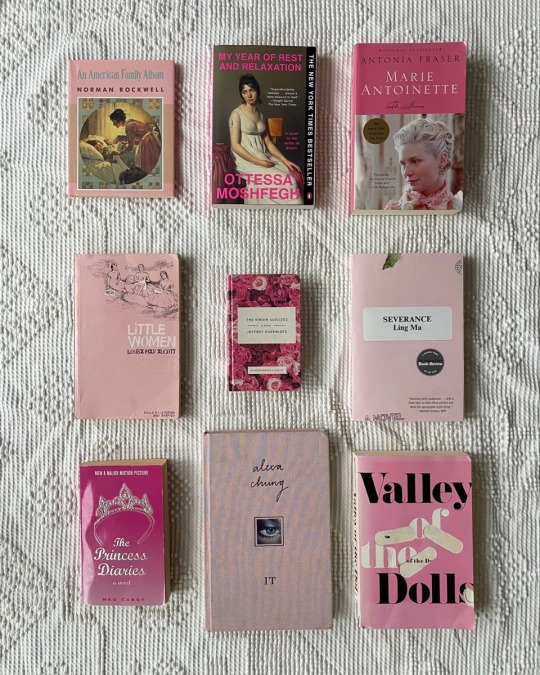
#diamondsandcigarette#2014 tumblr#coquette#girlblogger#girlblogging#model aesthetic#pink pilates princess#soft aesthetic#books#norman rockwell#my year of rest and relaxation#ottessa moshfegh#marie antoinette#little women#the virgin suicides#alexa chung#valley of the dolls#jeffrey eugenides#severance#louisa may alcott#ling ma#antonia fraser#an american family album#pink aesthetic
83 notes
·
View notes
Text
Some thoughts on "Little Women" and the "Little House" books
In the endless discussions by Little Women fans of the issue of "Jo vs. Amy," I've noticed a slight recurring theme, both when Amy's defenders discuss Jo and when certain Jo fans put Amy down. It's the idea that the books' narrative inherently favors Jo and is biased against Amy. That Jo is the character whom readers are clearly "supposed to identify with," as if Louisa May Alcott expected most of her young girl readers to be free-spirited, ambitious tomboys who struggle with gender expectations. And that Amy's portrayal is "negative," or at least that we're supposed to view her femininity and love of refinement as slightly silly and annoying.
Not too long ago, I found similar sentiments in an essay by a woman writing about her childhood experience of Laura Ingalls Wilder's Little House books. She wrote that she never identified with spunky, tomboyish Laura, but as a girly girl and as an eldest daughter who felt pressured to be "the responsible one," she related more to Mary. Then she complained that the books seem to expect readers to identify with Laura, and that we're "not supposed to like Mary."
I'm not sure those claims ring true for either of these literary works.
Both Little Women and the Little House books are autobiographical. Louisa May Alcott based the March family on her own family and Jo on herself, while Laura Ingalls Wilder wrote explicitly about herself and her family without changing the names.
In Little Women, I don't feel as if Alcott expected readers to identify more with Jo than with the other three sisters. Yes, Jo gets the most emphasis of them all, but that's because Alcott personally identified with her. Likewise, in the Little House books, Laura is the protagonist because she was the author. It's only natural that she wrote about her childhood from her own viewpoint, not because she thought readers would relate more to her than to her sisters.
Nor do I think Little Women is overly biased against Amy. Is her portrayal complex, and does it reflect Alcott's complex relationship with her sister May? Yes. Does Alcott use Amy to make fun of May's childhood foibles? Yes. Does she make it clear that May often drove her crazy when they were young, and does her envy of May's charms and social life sometimes bleed through the text? Of course! But none of it seems really mean-spirited; her affection and respect for May also come through clearly. Besides, she's just as willing to use Jo's foibles to make fun of herself.
And in the Little House series, do we really think Wilder set out to insult the memory of her beloved and by then deceased sister Mary? Just because she was honest about their childhood sibling rivalry and made readers feel for her envy of her "perfect" sister doesn't mean she wanted the readers to dislike her.
Maybe I'm giving these authors too much benefit of the doubt. But "An author writes about her own family, makes herself the protagonist, and honestly portrays both her closeness and her sibling rivalry with a sister who was very different from herself" doesn't inherently mean "The author expects all readers to identify with her self-insert and dislike her sister."
#little women#little house on the prairie#the little house books#louisa may alcott#jo march#may alcott nieriker#amy march#laura ingalls wilder#mary ingalls
81 notes
·
View notes
Text
It's not like I know a lot about the publishing history of Little Women, but I'm still shocked that I only recently heard about The Heir of Redclyffe as an influence on it. Because the earlier book centers around an orphaned young man who inherited musical talent from his Italian mother, was raised by a strict grandfather, gets semi-adopted into a lively family circle, struggles with passionate emotions, and falls in love with their daughter Amy.
#books#the heir of redclyffe#little women#charlotte mary yonge#louisa may alcott#i think i might like sir guy better than laurie#he's my little scrupulous gothic hero boy#(well the scrupulous part comes from trying to avoid the gothic hero part)#(it's quite endearing)
91 notes
·
View notes
Text

Hallo my friendly neighbor, I'd rather take some milk to my coffee than compliments just now
47 notes
·
View notes
Text

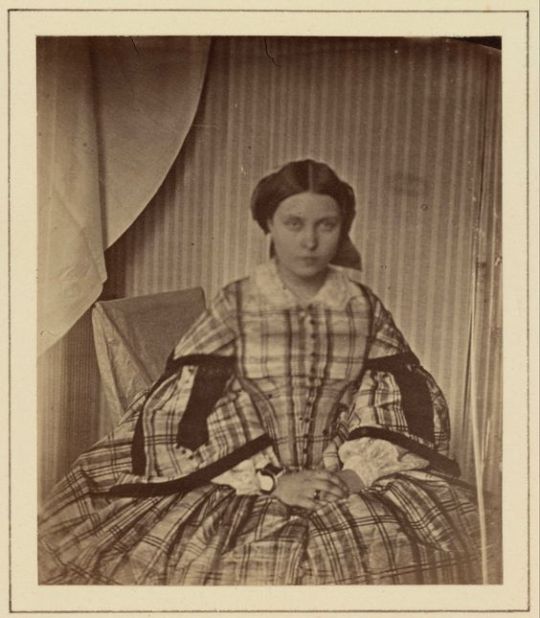
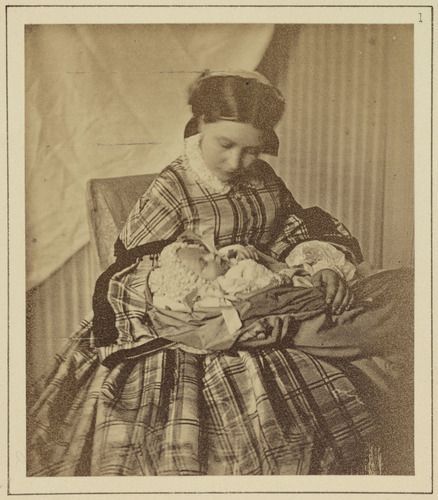
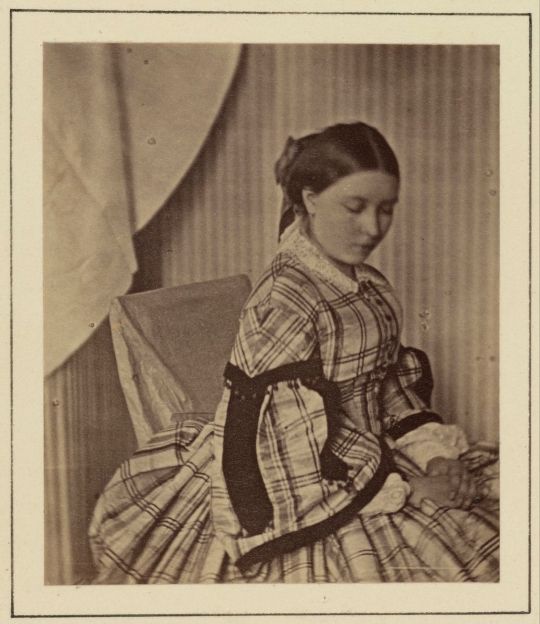
Victoria, Princess Frederick William of Prussia, March 1859
Victoria was the eldest daughter of Queen Victoria of Great Britain and Prince Albert of Saxe-Coburg and Gotha. She is pictured here with her first child, future Emperor Wilhelm II, agd. about two months.
#victoria princess royal#victoria adelaide mary louisa#wilhelm ii#old royals#prussian royal family#prussian history#prussian royalty#english royal family#british royal family#british royalty#english royalty#english history#british history#old photo#vintage photograph#victorian photography#victorian photo#antique photo#antique photograph#1850s#1859#e
19 notes
·
View notes
Text
one thing i find funny (but probably shouldn't) about persuasion is that jane austen writes herself into a bit of a corner with regards to louisa musgrove and to get herself out of it she gives louisa permanent brain damage !!!!!!!!
wentworth himself admits all of the flirting prior to the fall has made everyone think theyre engaged (and possibly louisa thinks so too) and so he cannot pursue anne like he truly wants too because he won't jilt lousia.
and obviously jane austen needs to find a way for this couple to face obstacles but also end up together, so when shes got everyone convinced there something between wentworth and louisa she gives louisa a massive head injury that permanantly alters her behaviour. at the end of the novel charles musgrove tells anne that ever since her accident and coma louisa hates loud noises and twitches about and needs to be soother by captain benwick. obviously now we can read that as brain damage from her huge head injury.
idk theres just something so extreme about jane austen's most romantic and melancholy novel about reuniting with your lost love also featuring brain damage as a plot device to break up a potential relationship!!!!!! its bananas to me!
#persuasion#anne elliot#captain wentworth#jane austen#literal brain damage#lyme regis#louisa musgrove#the accident#persuasion novel#charles musgrove#mary musgrove#wentworth and anne#persuasion jane austen#jane austen books
13 notes
·
View notes
Photo
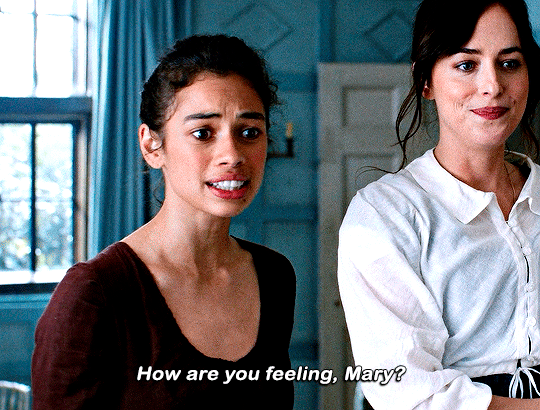
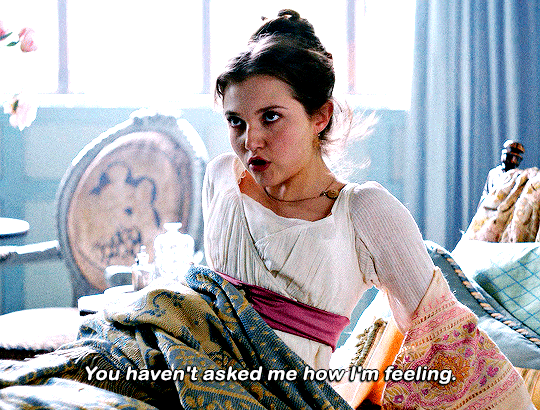
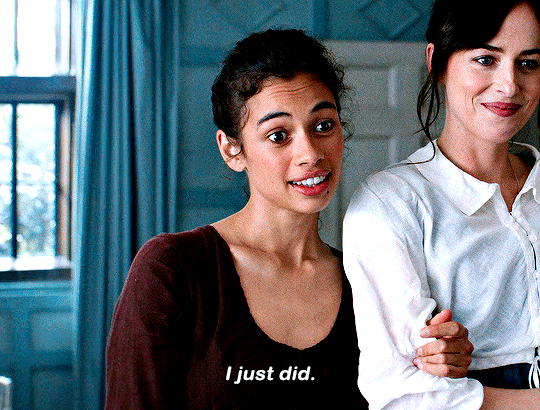
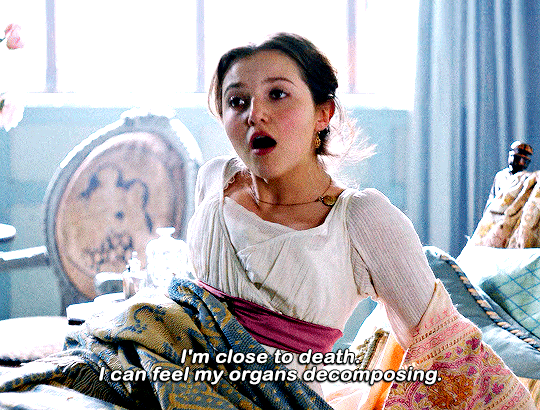
PERSUASION (2022)
#persuasion#persuasionedit#persuasion 2022#nia towle#mia mckenna-bruce#louisa musgrove#mary musgrove#perioddramaedit#weloveperioddrama#perioddramasource#mine#they were the best part of the movie
211 notes
·
View notes
Text
Sisters, 1972

Danièle Breton rencontre Phillip à un jeu télévisé. Elle le séduit, le ramène chez elle puis couche avec lui. Le lendemain, l'amant entend une dispute entre Danièle et sa soeur jumelle. De sa fenêtre, la journaliste Grace Collier voit Danièle l'assassiner sauvagement. Elle... ou sa soeur jumelle ? Grace appelle la police, qui ne la croit pas, et décide donc de mener sa propre enquête. Seulement, derrière ce meurtre se cache une incroyable et monstrueuse histoire d'amour qui va vite se transformer en cauchemar pour la journaliste...
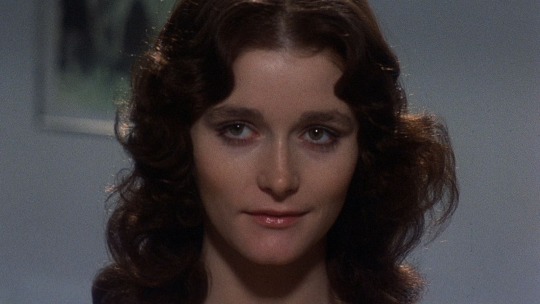


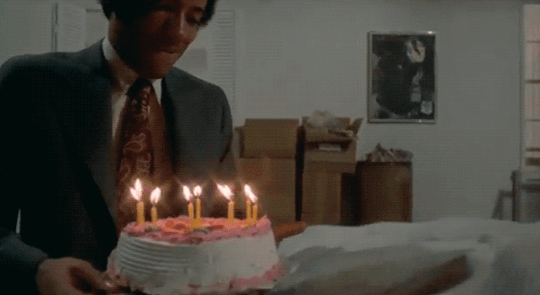
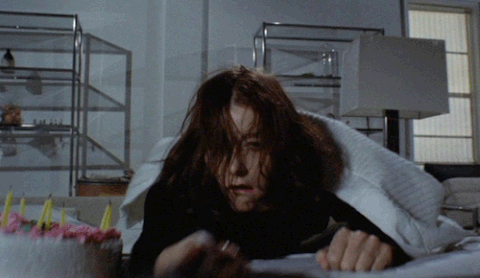
Brian De Palma est un réalisateur surprenant car il peut autant vous délivrer un cinéma fascinant qu'un navet autrement dit il est instable. Toujours est-il que celui-ci appartient à la première catégorie. Oscillant entre Hitchcock et Argento, Brian De Palma rédige et signe un thriller effroyable, possédant un scénario de très grande qualité et qui plus est regorge de rebondissements. Le film relate l'histoire de deux soeurs siamoises, l'une agréable et l'autre agressive. Sans vous dévoiler le fin mot de l'histoire, il faut vraiment saluer le travail de mise en scène du réalisateur américain. S'appuyant sur une musique terrifiante de Bernard Herrman, Brian De Palma instaure une ambiance malsaine et délivre des plans étonnants ce qui a fait sa réputation de plus grand cadreur de tous les temps, inventant l'image coupée en deux afin de suivre simultanément deux scènes ou évènements. Un film qui débuta le domaine du cinéma d'horreur aux Etats-Unis. Si le film a aussi bien vieilli, c'est parce que le film ne possède aucun temps mort et que le réalisateur allait s'affirmer comme l'un des réalisateurs les plus efficaces de tous les temps. Traduisant le malaise entre deux soeurs siamoises, le film est un formidable témoignage pour défendre cette catégorie de personnes qui appartient à la rareté. Mettons-nous à leur place. Est-il facile déjà d'avoir un jumeau ? Et est-il encore plus facile pour une personne d'être condamnée à rester collée à elle pour le reste de leur vie ? La chirurgie moderne permet aujourd'hui que ce problème génétique soit bien traité mais uniquement dans certains cas! Imaginons que deux frères jumeaux soient collés au cerveau, peut-on leur apporter cette aide précieuse qui est basique pour nous qu'est l'intimité ? Thriller virtuose, réalisation parfaite, sujet rarement abordé dans l'histoire du septième art, ce film permet au spectateur de penser qu'il peut se sentir heureux d'être seul et de ne pas souffrir de schizophrénie. Un excellent long-métrage !

Official Trailer - SISTERS (1973, Brian De Palma, Margot Kidder, Charles Durning)
youtube
#brian de palma#Sisters#Sœurs de sang#Sisters sœur de sang#film#movie#movies#cinema#cinephile#Louisa Rose#Margot Kidder#Jennifer Salt#Charles Durning#William Finley#Lisle Wilson#Barnard Hughes#Mary Davenport#Dolph Sweet#Bernard Herrmann#70s#usa#1970#Youtube#Horreur#Horror#epouvante#Thriller#American movie#psychological
7 notes
·
View notes




